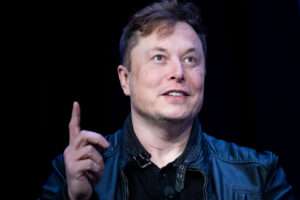The Volokh Conspiracy
Mostly law professors | Sometimes contrarian | Often libertarian | Always independent
Elon Musk's Story Highlights Harm Caused by Immigration Restrictions
Immigration restrictions nearly prevented Musk from making his major contributions to economic innovation, and they do block all too many other potentially great innovators.

A recent Washington Post article shows Elon Musk was, for a time, working illegally in the US, and subject to deportation. He was able to remain in the US and eventually legalize his status because law enforcement was either unaware of his status or chose to look the other way. Much of the commentary on this issue focuses on Musk's hypocrisy: he has since become an advocate of hardline policies on illegal migration, under which people like Musk himself would be deported.
But Musk's story also highlights the harm caused by immigration restrictions. Cato Institute immigration policy expert Alex Nowrasteh explains:
What bothers me in the WaPo article is how destructive the US immigration system is. It almost didn't allow Elon Musk to settle here and build several innovative firms, push technological breakthroughs, and build enormous consumer surplus and shareholder value. Musk is a 1 in a billion innovator and businessman. If the US immigration system blocked at least one other Musk-type entrepreneur from coming here in the last century, then this should make intelligent nativists rethink their position. Few of them would want to kick Musk out now, but they support rules and enforcement that could stop the next Musk from coming or staying here. Musk was bright before he got a work visa, but there was little indication that he'd become the wealthiest man in the world. The conceit of immigration central planners almost cost us Musk's talents. Let's stop ignoring the right tail of the distribution and error on the side of letting more people in – one of them could take us to Neptune. I hope that readers of this story will come away with the same lesson instead of focusing on the hypocrisy.
Had Musk been forced to return to South Africa, he probably would never have had the opportunity to make major innovations and found Tesla and SpaceX.
Immigrants contribute disproportionately to a wide variety of entrepreneurial and scientific innovations. As discussed more fully in my article "Immigration and the Economic Freedom of Natives," that means large-scale immigration restrictions inevitably keep out significant numbers of people who might otherwise become major innovators or make important scientific breakthroughs. The immigrant we keep out today might have gone on to make a scientific discovery that could have saved your life, or that of one of your loved ones.
Obviously, a small fraction of would-be immigrants will become major innovators. But that small fraction is extremely important. And the cumulative impact of keeping out large numbers of ordinary migrants is that we also lose massive economic and scientific contributions by major innovators.
I am a bit less bullish about Musk's impact, in particular, than Alex Nowrasteh is. The benefits of his great innovations are partly offset by his harmful impact on political discourse, such as promoting bogus conspiracy theories about immigration ("great replacement theory") and voter fraud. On balance, however, the benefits of Musk's presence in the US almost certainly outweigh the costs. The real problem with political misinformation is a matter of demand more than supply. So long as there is a large demand for conspiracy-mongering claptrap, political entrepreneurs are likely to supply it. The particular claptrap that Musk promotes wasn't invented by him, and had widespread dissemination (including by Donald Trump) before Musk became involved. By contrast, Musk's entrepreneurial innovations are far less likely to have been quickly achieved by others, if he weren't around. And Twitter was a cesspool of awful political discourse long before Musk bought it. At most, he made it marginally worse.
There's a chance Musk might ultimately have a massively deleterious political impact. But more likely, he has just somewhat amplified terrible ideas that were already getting widespread dissemination. In addition, I would be wary of empowering government keep out migrants on the theory that they might spread harmful political ideas. If we don't trust government to censor supposedly harmful ideas disseminated by natives, the same reasoning also undermines the case for ideological screening of immigrants. Elsewhere, I have addressed in more detail the issues raised by the possibility that an extraordinary individual migrant could cause great harm as a political leader or a producer of harmful technological innovations.
In sum, the real lesson of Musk's story as an illegal migrant worker is that immigration restrictions often block tremendously valuable innovation. Musk was lucky enough to get around the system. All too many other potentially great innovators aren't as fortunate.


Show Comments (64)